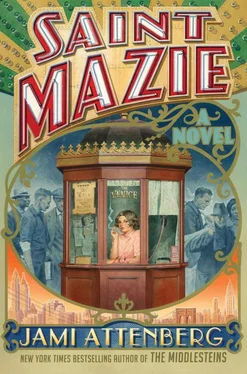I needed no saints though, not today anyway. I had all of Park Row with me.
Mazie’s Diary, January 1, 1923
Sweet Jesus is this house empty.
Mazie’s Diary, January 10, 1923
Last night I came in and I found Rosie standing at Jeanie’s door, her arms crossed, back hunched, face all twisted up into something I didn’t recognize. I touched her real gently on her back and she jumped, spooked. I stroked her back and calmed her.
I said: What are you thinking about?
She said: That money’s no good.
I said: It isn’t, but it’s ours anyway. And we’re good.
She said: Do you really think we’re good?
A year ago or maybe two or three I would have said we weren’t good, or at least that I wasn’t. But I know a little more these days.
I said: Well, we’re not bad. We’re definitely not bad people, Rosie. And that will have to do for now.
Mazie’s Diary, January 15, 1923
This morning, Rosie came into the city with me. First time she’d left the neighborhood since Louis died and we went to see the lawyer. She said she needed to check on the buildings in Chinatown, that she’d been hearing all kinds of stories about them being run into the ground. We might need a new superintendent. She wore a tidy suit. There was a new hat too, violet colored with a jewel on it, and some lace netting she drew around the edges of her face. There was some color on her cheeks. Where it came from I’ll never know. I only see it as a sign of life.
Mazie’s Diary, February 10, 1923
Sister Tee needed to buy some winter coats for some girls she knew so I took some money from the envelopes in Jeanie’s room. Not even an entire envelope, just a few bills was all it took. I don’t know what else it’s there for if not that.
Mazie’s Diary, March 13, 1923
Rosie took the train again with me this morning.
I said: More business in the city?
She said: I’m getting my hair done.
I said: Your hair looks fine.
She said: You got a problem with me going to the city, miss?
I said: I’m just asking what your business is, is all.
It went on like that for another stop, us having a not-conversation. Everything felt flipped around, me wondering what she was doing, her not answering me straight.
I said: Do what you like.
She said: I don’t need your permission.
The subway door opened just then and she got off. Her back to me on the platform. She didn’t even turn and wave.
Mazie’s Diary, April 3, 1923
There were forty-six envelopes in Jeanie’s room and now there are forty-one. I’m not crazy. I counted them myself. There were forty-six in February when I took money for Sister Tee. It’s not mine to wonder but wonder I will.
Mazie’s Diary, April 20, 1923
A postcard from Jeanie, Los Angeles. The sign that says HOLLYWOODLAND in the hills. I’ve been seeing pictures of that sign in my magazines forever. I got a little excited, I couldn’t help myself. But then I flipped it over.
It said: What happened to you just happened to me & it is terrible, Mazie.
A lot of things have happened to me in this life but I knew exactly what it was she was talking about.
As much as I wanted to add this postcard to my wall, I threw it away. I know it’s bad juju to have bad news floating all around you. Same as that money too, still sitting in our house. Thirty-nine envelopes left.
Mazie’s Diary, May 1, 1923
Tea leaves in a saucer, a haze of incense in the house. Dishes in the sink. Rosie’s nowhere. The house stinks of gypsies. I could not bring myself to count the envelopes.
Elio Ferrante
My grandmother on my father’s side was part Romany, but she was not the kind of gypsy who conned, and anyway, even if she was, she married out of it. Her skin was colored so that she could pass for Italian, like Sicilian Italians, the real Mediterranean Italians. You should see me in the summer, my skin gets so dark, I can pass for all kinds of ethnicities, Latino, African-American. I’m a citizen of the world come June. Anyway, my grandmother knew grifters, and there were stories passed around our family, cautionary tales more than anything. One of them was about being a single person, a lonely person looking for companionship or comfort. Widows were easy targets. There was one con where they’d tell these widows, Oh, you give us X amount of dollars, ten dollars, a hundred dollars, a thousand dollars, whatever, and we’ll burn it, we’ll burn your loss away, we’ll burn your pain away. And then it’s just this sleight-of-hand trick — they take the money during these sessions and they slip it into the linings of their skirts. They kept everything in these skirts. Coins, jewels, and cash. Gypsy skirts were like Fort freaking Knox.
Mazie’s Diary, July 9, 1923
I know that it was wrong when all Rosie did was clean, but now the house is pure filth. Worse, the summer heat is roasting the dirt. A trail of tea leaves across the kitchen table. A line of ants following. A march. I’m at the theater all day and night, holding everything together while Rudy’s out again. I can’t do it all. I can’t. I need help.
Lydia Wallach
Rudy had five heart attacks in his lifetime. I’d guess in 1923 it was probably his third heart attack? Some of them were smaller than others. Each one he bounced back from within a few weeks, until the last one, from which he did not bounce back at all. He was this calm, loving, supportive man who took on the pain and stress of others without flinching, and his heart attacks were his moment of flinching. And when he was in the hospital, everything collapsed around him. My great-grandmother, their children, the theater. He held all these worlds in his head. I understand this. If you let go for a second, it all unravels. The loose threads of the universe.
Mazie’s Diary, July 15, 1923
I told Sister Tee everything about Rosie. It felt so good to tell someone even one little thing about my life, and this feels like the only thing in my life now. That and the theater.
Tee hates the gypsies as much as Tee is capable of hating anyone. She thinks they’re godless. I told her I’d known some kind ones but she’s come up against them too many times to forgive or at least to forget.
She said: They’ll rob you blind then leave you standing on the corner in the cold and the dark.
I said: I don’t think she thinks she’s being robbed.
She said: I think that money could be better spent elsewhere.
I said: But what if it soothes her?
She said: A con’s a con. Those gypsies should be punished.
When Tee turns to tough talk I have to laugh and kid her.
I said: Where’s your forgiveness, Tee? I thought everyone had a saint.
She stopped her ranting and thought about it.
She said: Saint Dismas watches over criminals. But it’s the ones who are seeking pentinence that he cares for.
I said: And these gypsies don’t care.
She said: They don’t care one bit.
Mazie’s Diary, August 28, 1923
I took the money. I took it and I put it somewhere she can’t find it. There were just twenty envelopes when I did so. More than enough money to last us a long time, yet it seemed like not very much at all considering what we started with. It’s not hers, it’s not mine. It belongs to strangers now.
Isabel Kaller, bookkeeper, Church of the Transfiguration, Chinatown
We’ve got archives dating back to the late 1800s. They’re treasures, really. All of the bookkeepers over the years have had the most darling handwriting. These teeny tiny letters and numbers in perfectly straight rows. It’s very sweet to me. I like the way the ledgers feel too. They have a real heft to them.
Читать дальше












